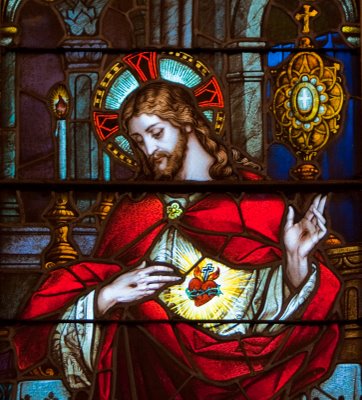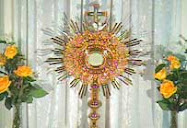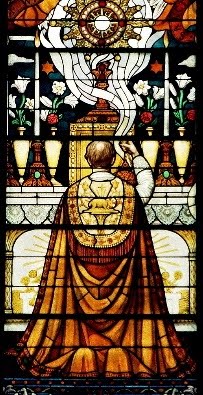Saturday, May 29, 2010
Blessed Teresa: Benefits of Spending Time With Jesus in the Blessed Sacrament
Thursday, May 27, 2010
Fr. William Casey: Holy Mass is the Greatest Act of Worship
Wednesday, May 26, 2010
St. Philip Neri: Overcome With Love for Jesus in the Eucharist
~ St. Philip Neri ~
The time came for Philip Neri to become Father Philip Neri. His confessor convinced him he could do more good fighting the heresies and paganism destroying the very fiber of our Church and the Mystical Body of Christ, as a priest. He obeyed! He was ordained at thirty-six. His first Mass, he became so overcome with emotion, shaking almost uncontrollably, he could barely pour the wine and water into the chalice. At the moment of Consecration, when he elevated the Host, he had to lean against the altar for support, as he feared he would fall over if he did not brace himself. This would repeat itself at every Mass he said.
He was never too sick to celebrate the ongoing Sacrifice of the Cross every day. He united himself so deeply with the Lord, His last hours on the Cross, that at the moment of elevation, he would levitate, suspended over the altar for more than two hours. For this reason, toward the end of his life, in order to not attract attention to himself, rather than to the Mass and what is truly happening on the altar, he celebrated Mass privately in a little chapel adjacent to his room. His first biographer said he came upon St. Philip many times, elevated as high as six feet from the floor while saying the Mass.
...During the forty hour devotions, which he loved, he preached so passionately about the God-Man Jesus Who was alive in the Monstrance that one day there were thirty conversions, young men who had come to church to ridicule Father Neri and disrupt the Mass, but after hearing him, converted and asked to go to confession. More and more people returned to the Sacraments after many years away from the Church. He began teaching in his private chamber; from this, more and more came, and before you know it the Congregation of the Oratory was formed. Philip Neri was thirty seven years old.
Tuesday, May 25, 2010
St. Mary Magdalen de Pazzi: Reparation for Offenses Committed Against Jesus
~ St. Mary Magdalen de Pazzi ~
After she had been sick for two months, the doctors gave her up for lost, whence the superiors /the prioress, Sister Victoria Contugi, and the mistress of novices, Sister Evangelist del Giocondo/ decided to have her make her holy profession. This was done on the 27th day of May, 1584, during the morning of /the feast of/ the Most Holy Trinity» (Breve Ragguaglio, pp. 90-2).
Mary Magdalen made her profession «on a cot arranged before the altar of the Virgin» (Processes, I p. 44) and was then immediately brought back to the infirmary. From that moment on there began a surprising period of ecstasies; every day after Communion she remained ecstatic for two or three hours. Sometimes she had new and repeated excesses of love during the day as well, with the renewal of the divine favors. The experience lasted uninterruptedly for forty days, during which the following mystical phenomena occurred and should be remembered: a vision of the drama of the Passion (especially noteworthy is that of June 8), the exchange of her heart with that of Jesus (June 10), the first invisible impression of the stigmata (June 28). Moreover, on July 6 she received the crown of thorns from Our Lord, in the presence of St. Catherine of Siena and of St. Augustine; and she was to suffer the mysterious pain of the crown for the rest of her life.
She was cured on July 16 at the intercession of the Blessed Mary Bagnesi; and subsequently the life of Mary Magdalen became a succession of visions, ecstasies, other mystical phenomena, penances and trials. On the evening of March 24, 1585, the vigil of the Annunciation, St. Augustine wrote the words «Verbum caro factum est» /The Word was made flesh/ on her heart. On April 15 the invisible stigmata were imprinted on her soul permanently; on the 28th she received a ring from Jesus, the seal of her mystical espousal with Him. On Friday, May 17, she had the longest of any of her ecstasies until then. It began on the afternoon of Friday and was prolonged for forty hours, until the following Sunday morning. On the 21st she received the Lord's command to take only bread and water as nourishment, except on Sundays and holydays, on which days she would be able to take «Lenten foods.» Furthermore, Jesus ordered her to rest only five hours a day, on a straw mattress, in satisfaction, for the offenses that are committed against Him» (II, p. 877 /III, 285/). (Source)
Saturday, May 22, 2010
St. Rita of Cascia: Eucharistic Miracle of Cascia
More information available from the National Shrine of St. Rita of Cascia.
At Cascia, in the basilica dedicated to St. Rita, is also preserved the relic of the Eucharistic Miracle, which happened near Siena in 1330. A priest was asked to bring Communion to a sick peasant. The priest took a consecrated Host which he irreverently placed in the pages of his breviary and went to the peasant. When he arrived at the house of the sick man, after hearing his confession, he opened the book to take out the Host which he had placed there. To his great surprise hefound that the Host was stained with living blood, so much as to mark both pages between which the Blessed Sacrament had been placed. The priest, confused and penitent, went immediately to Siena to the Augustinian Priory to ask the counsel of Fr. Simone Fidati of Cascia, known by all to be a holy man. Fr. Fidati, having heard the story, granted pardon to the priest and asked to keep the two pages marked by Blood. Many popes have promoted veneration, conceding indulgences.
~ Excerpt and more information, including pictures, from here. ~
Thursday, May 20, 2010
St. Peter Julian Eymard: "Be the Apostle of the Divine Eucharist..."
~ St. Peter Julian Eymard ~
Tuesday, May 18, 2010
Pope John Paul II: Acts of Reverence for the Blessed Sacrament
because it is an act of faith in Christ,
~ Pope John Paul II ~
Monday, May 17, 2010
St. Paschal Baylon: Saint of the Blessed Sacrament
~ St. Paschal Baylon ~
The notice of St. Paschal Baylon in the Roman Martyrology tells us not only that he was a man of wonderful innocence and austerity of life, but also that he has been proclaimed by the Holy See patron of all eucharistic congresses and confraternities of the Blessed Sacrament. It is a striking fact that a humble friar, of peasant birth, who was never even a priest, whose name in his own day was hardly known to any but his townsfolk in a corner of Spain, should now from his place in Heaven preside over those imposing assemblies of the Catholic Church.
It is, however, as the Saint of the Eucharist that St. Paschal is best remembered outside his own country. Many years before the great work on annual eucharistic congresses was instituted and our saint was nominated its patron, the title-page of Father Salmeron's Spanish biography bore the heading Vida del Santo del Sacramento S. Pascual Bailon. The long hours which he spent before the tabernacle, kneeling without support, his clasped hands held up in front of, or higher than, his face, had left a deep impression upon his brethren. No wonder that he was for them the "Saint of the Blessed Sacrament." The recognition of this special characteristic goes back to his earliest biographer. Ximenes tells us how the good brother, whenever he had a moment free from his other duties, invariably made his way to the church to honor the presence of our Lord, how it was his delight to serve Mass after Mass in succession beginning with the very earliest, how he stayed behind in choir when after Matins and Lauds the rest of the community had retired again to sleep, and how the dawn found him still on his knees, eager as soon as the bell range to visit the altars at which the Holy Sacrifice was to be offered.
Friday, May 14, 2010
Stations of the Holy Eucharist
At each Station of the Eucharist, pray: “O Sacrament Most Holy, O Sacrament Divine. All praise and all thanksgiving be every moment Thine.”
~ Stations of the Holy Eucharist: here ~
~ Copies to purchase: available here ~
Wednesday, May 12, 2010
Pope John Paul II: "May Our Adoration Never Cease."
Tuesday, May 11, 2010
Holy Sacrifice of the Mass: Favorite Devotion of the Saints
~ St. Peter Julian Eymard ~
Monday, May 10, 2010
Pope John Paul II: Testimony of Faith in the Eucharist
Friday, May 7, 2010
Fr. Samuel Medley: Reparation to the Sacred and Eucharistic Heart of Jesus
This was the blessing I gave at the end of my first Mass in Robstown, TX. It was in Latin. The blessing in english is, "Through the intercession of the Blessed Mary ever Virgin, Daughter of the Father, Mother of the Son, Spouse of the Holy Spirit, May Almighty God Bless you, + the Father, the Son, and the Holy Spirit. Amen.
Thursday, May 6, 2010
St. Dominic Savio: Reverence for the Blessed Sacrament
Do you want few graces? Visit the Blessed Sacrament rarely.
Do you want none at all? Then never pay a visit to the Blessed Sacrament,"
~ St. Dominic Savio ~
Fr. Giovanni Zucca from Moriondo, who was then the chaplain at Murialdo when Dominic was five years old,[18] notes in a statement to John Bosco that he came to notice Dominic due to his regular church attendance with his mother, and his habit of kneeling down outside the church to pray (even in the mud or snow) if he happened to come to Church before it had been unlocked in the morning. The chaplain also notes that Savio made good progress at the village school not merely due to his cleverness, but also by working hard; he would not join the other boys in doing something that he believed to be morally wrong and would explain why he thought a particular deed was wrong;[19] At the age of five, he learned to serve Mass, and would try to participate at Mass every day as well as go regularly to Confession. Having been permitted to make his First Communion at an early age, he had much reverence for the Eucharist.[20].
First Communion
At that time, it was customary for children to receive their First Communion at the age of twelve.[21] (Pope Pius X would later lower this age to seven[22][23]) After initial hesitation, and subsequent consultation with other priests, the parish priest agreed to permit Dominic to receive his First Communion at the age of seven, since he knew the catechism and understood something of the Eucharist.[24] He spent much time praying and reading in preparation,[25] asking his mother's forgiveness for anything he might have done to displease her and then went to Church. In his biography of Dominic Savio, John Bosco devotes a chapter to tell of Dominic's First Communion. He says that several years later, whenever Dominic talked of the day of his First Communion, he said with joy:
"That was the happiest and most wonderful day of my life"[26]
John Bosco records that on the day of his First Communion, Dominic made some promises which he wrote in a "little book", and re-read them many times. John Bosco once looked through Dominic's book, and he quotes from it the promises that he made:[27]
Resolutions made by me, Dominic Savio, in the year 1849, on the day of my First Communion, at the age of seven.
1. I will go to Confession often, and as frequently to Holy Communion as my confessor allows.
2. I wish to sanctify the Sundays and festivals in a special manner.
3. My friends shall be Jesus and Mary.
4. Death rather than sin.[28]
Wednesday, May 5, 2010
One American Priest's Perspective on Communion in the Hand
"When receiving the Body of Christ on the hand, the faithful must be aware of the fact that each and every particle, no matter how small, is truly the Body, Blood, Soul and Divinity of Jesus Christ, the Second Person of the Blessed Trinity. Therefore no particle should ever be discarded or treated with less than total respect due to the Body of Christ.
"The faithful must also be reminded that their hands must be clean to receive our Lord, Jesus Christ.
"When ordained in 1986, I was a proponent of receiving Communion in the hand, but time has changed my thinking on this issue. Seeing so many abuses and forming a deeper respect for Jesus’ true Presence in the Holy Eucharist were the factors which forced me to rethink my position."
"In my twenty-four years as a priest, I have served in many parishes and witnessed many Eucharistic abuses caused by receiving in the hand. I have picked Jesus off the floor from under pews and picked Him out of hymnals. I have followed people back to their seats and asked if they would give me the host back (they bring it out of a clinched hand or out of their pockets) and have witnessed many other sacrilegious desecrations of the most Blessed Sacrament, far too many and varied to mention, some so shocking most people would simply not believe my words.
"As I began to see these desecrations of the Holy Eucharist, I began to understand how very sickening, disheartening and avoidable all of this actually has been. Many religious education programs teach the children how to receive on the hand, with at most a cursory mention of the traditional way of receiving on the tongue. Why? The Church documents do not support such teaching. It was the same with many American dioceses in the 1960’s when the faithful were being coerced into receiving on the hand a decade before being granted the indult."
"Our Holy Father, Benedict XVI leads by example. Since becoming Pope, anyone receiving Holy Eucharist from him must receive on the tongue and kneeling. He is not requiring a change throughout the world, but is giving us a profound message by example.
"Proper respect shown to the Holy Eucharist is primary. Please consider these thoughts before receiving Holy Communion this Sunday. Thank you."
Monday, May 3, 2010
Blessed Mother: Perfect Adorer of the Most Blessed Sacrament
Everything in Mary was directed to the Blessed Sacrament
A current of grace and love established itself
~ St. Peter Julian Eymard ~
Sunday, May 2, 2010
St. Padre Pio: The Mystical Calvary of the Altar
Asked if the Madonna had been present at Mass, he answered: "Yes, she placed herself to the side, but I could see her, what joy! What paradise…" Has she attended only once, or is she always present? "How can the mother of Jesus, present on Calvary at the foot of the Cross, who offered her Son as victim for the salvation of souls, be absent at the mystical Calvary of the altar?" Is our Lady present at all of the Masses that are being celebrated in the world? "Yes." Do the angels also attend? "The whole celestial court is present."
"I cannot get tired, because when I celebrate Holy Mass I am not standing, but hanging on the cross together with Jesus, and I suffer inadequately all that Jesus suffered on the Cross, as much as is possible for a human creature. The Lord has deigned to associate me with the great work of human redemption, and this despite my every demerit, and only because of His supreme goodness."


